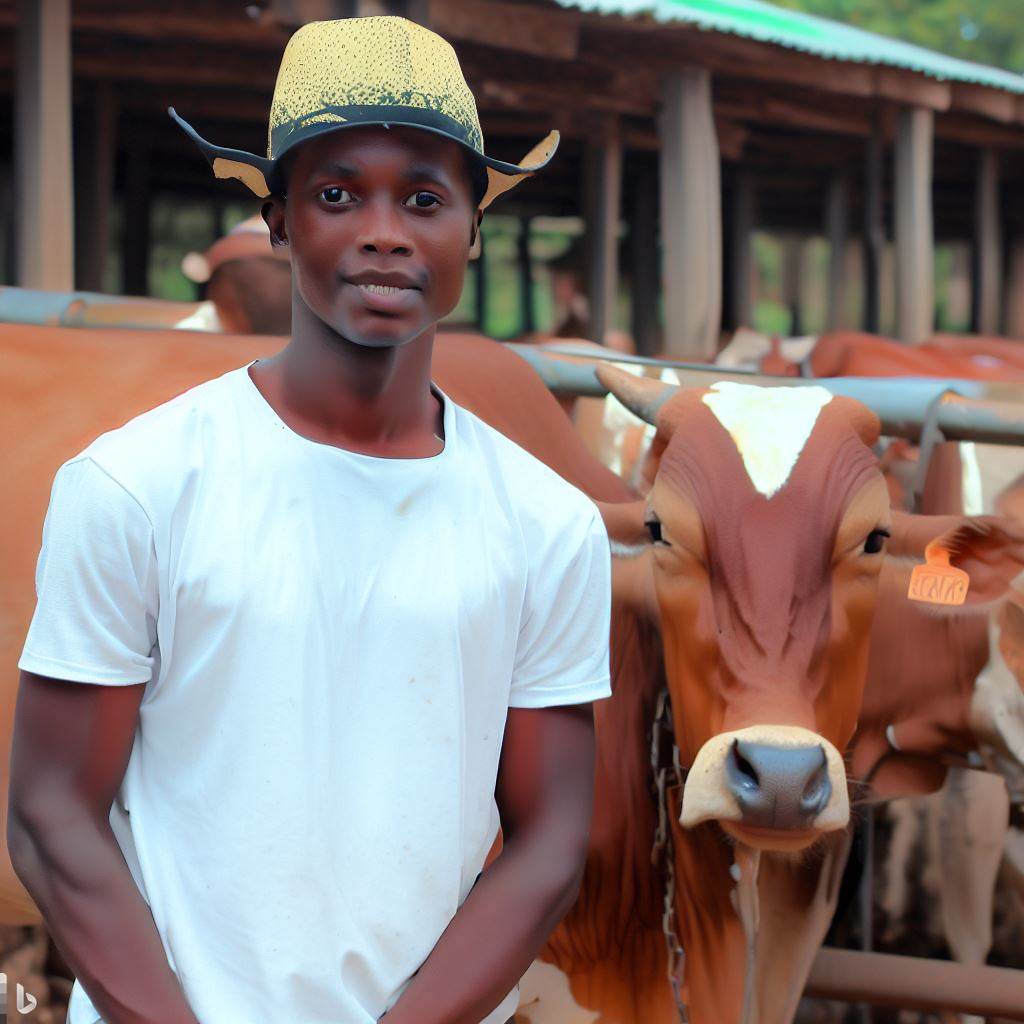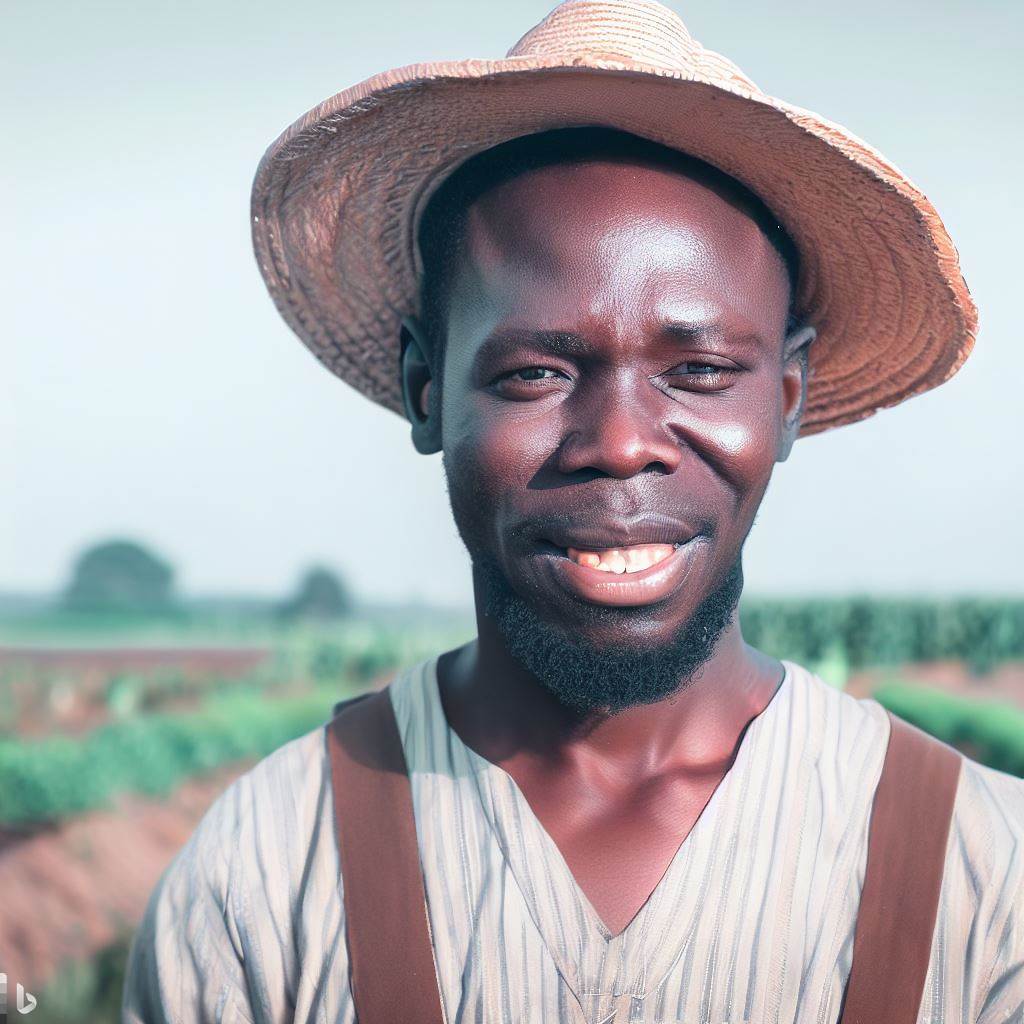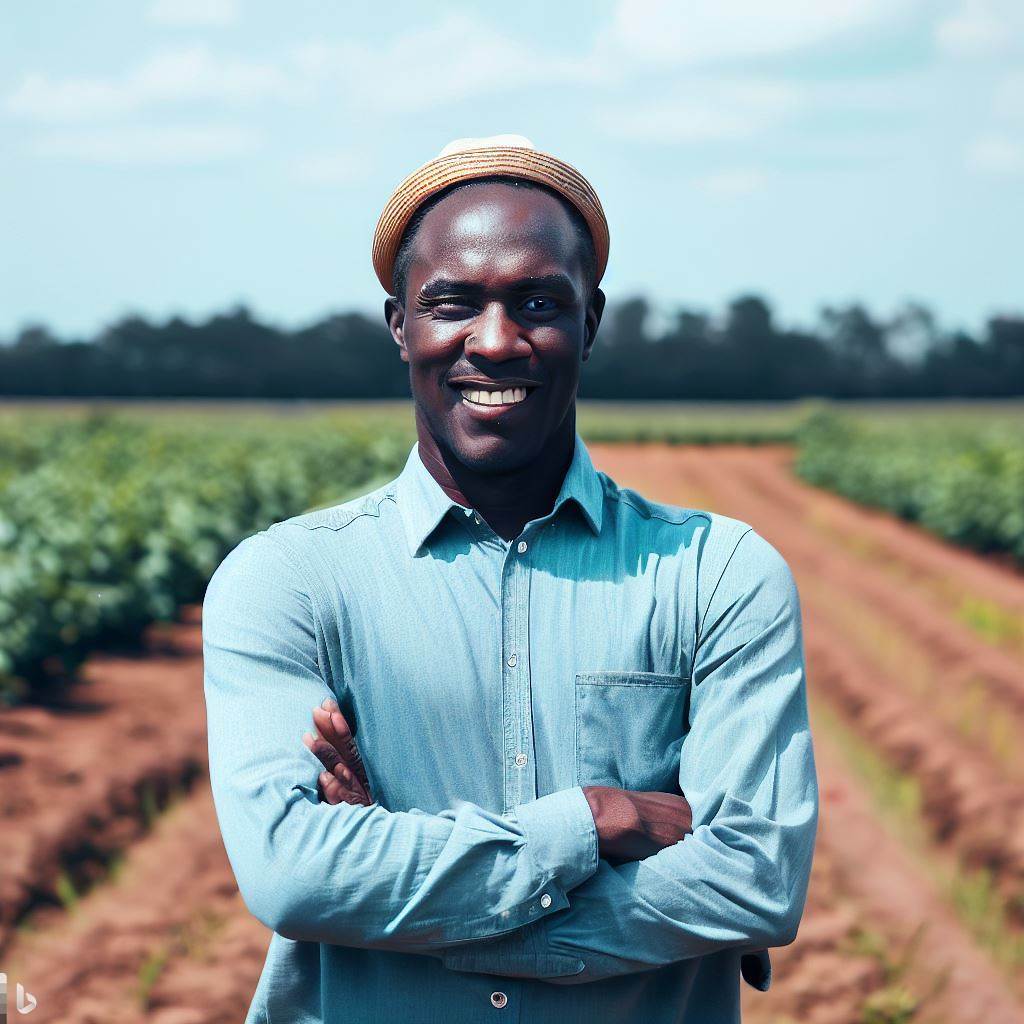Introduction
Livestock and dairy farming play a crucial role in global food security and economic stability. It provides nutritious food and livelihood for millions of people.
Over the years, there has been a growing interest among youth in getting involved in this sector.
Importance of livestock and dairy farming
Livestock and dairy farming not only provide a source of nutritious food, such as milk, meat, and eggs, but also contribute to the overall economic development of a country.
It creates employment opportunities, boosts rural economies, and ensures food security.
Increasing interest in youth involvement
In recent years, there has been a noticeable rise in the number of young individuals who are showing interest in livestock and dairy farming.
Multiple factors drive it: rising eco-awareness, longing for nature, and lucrative green business prospects, fostering sustainable agriculture’s growth.
Young people are recognizing that livestock and dairy farming can offer them a fulfilling and prosperous career.
They are attracted to the idea of working with animals, being stewards of the land, and contributing to the production of essential food products.
Moreover, the advancements in technology and innovative farming practices have made the sector more appealing and accessible to young farmers.
The involvement of youth in livestock and dairy farming is essential for the long-term sustainability of the sector.
Their fresh perspectives, enthusiasm, and willingness to adopt new ideas and technologies can help drive innovation and improve productivity.
It also ensures the transfer of traditional knowledge and practices to the next generation.
In the end, livestock and dairy farming hold great importance in ensuring food security, economic stability, and rural development.
The increasing interest of youth in this sector brings new hope and potential for its future growth and sustainability.
Encouraging and empowering young individuals to get involved in livestock and dairy farming can have significant positive impacts on both individuals and society as a whole.
Benefits of Livestock and Dairy Farming for Youth
Livestock and dairy farming empower today’s youth, fostering personal, professional, and financial growth through abundant benefits.
Skill development opportunities
- Hands-on experience with animals and farming techniques: By actively participating in livestock and dairy farming, young individuals gain practical knowledge and expertise in handling animals and implementing various farming techniques.
This hands-on experience equips them with valuable skills for a future in agriculture. - Learning about animal behavior and nutrition: Livestock and dairy farming involve understanding the behavior of different animal species and their specific dietary requirements.
Youth engaging in this practice acquire knowledge about animal nutrition, ensuring the animals’ well-being and optimal productivity.
Financial independence and entrepreneurship
- Income-generation potential through selling products: Livestock and dairy farming provide opportunities for young individuals to generate income by selling products such as milk, meat, eggs, and other related goods.
This financial independence helps them support themselves and their families, fostering self-sufficiency. - Starting one’s own small-scale farming business: For entrepreneurial-minded youth, livestock and dairy farming offer a platform to start their own small-scale farming business.
They can establish their brand, develop marketing strategies, and expand their operations, potentially creating employment opportunities for others in their community.
Personal and professional growth
- Developing responsibility, resilience, and problem-solving skills: Taking care of livestock and managing a dairy farm requires a sense of responsibility and resilience.
Youth involved in this industry learn to shoulder responsibilities, adapt to challenges, and find innovative solutions.
These skills translate into their personal and professional lives, enhancing their overall development. - Enhancing leadership abilities and teamwork: Livestock and dairy farming often involve working in teams and leading others.
Youth engaging in this sector have the opportunity to enhance their leadership skills, learn effective communication, and collaborate with fellow farmers.
These qualities are invaluable in various aspects of life, preparing them for future leadership roles.
In fact, livestock and dairy farming offer tremendous benefits to today’s youth, enabling their empowerment and growth.
Experience shapes skills, fostering animal behavior understanding. Entrepreneurship and financial independence arise, offering diverse benefits.
Additionally, personal and professional growth is fostered through the development of responsibility, resilience, problem-solving skills, leadership abilities, and teamwork.
By actively participating in these farming practices, youth can pave the way for a successful future while contributing to the agricultural sector’s sustainability and development.
Read: The Role of Livestock in Nigeria’s Food Security
Challenges Faced by Youth in Livestock and Dairy Farming
Despite the immense potential of livestock and dairy farming as a tool for youth empowerment, young people face several challenges in this sector.
These obstacles hinder their ability to fully harness the benefits and opportunities available.
Lack of resources and infrastructure
One of the primary challenges faced by youth in livestock and dairy farming is the lack of access to essential resources and infrastructure.
This includes limited availability of land for farming, insufficient equipment, and a lack of facilities for animal husbandry.
Without proper access to land, young farmers struggle to establish and expand their operations.
Land ownership and leasing options may be limited, making it difficult for youth to access the necessary space for livestock rearing and dairy production.
In addition to land, a lack of adequate equipment and facilities poses further obstacles. Young farmers often find it challenging to acquire essential machinery and tools needed for efficient farm management.
Similarly, limited access to appropriate facilities for animal housing and healthcare affects the quality of livestock and dairy production.
Financial constraints compound these challenges. The high costs associated with purchasing land, machinery, and building infrastructure present significant barriers for youth entering the livestock and dairy farming sector.
Limited capital resources make it challenging for young farmers to invest in their operations and improve productivity.
Limited knowledge and training opportunities
Another key challenge faced by youth in livestock and dairy farming is the limited availability of knowledge and training opportunities.
In order to succeed in this sector, young farmers require specialized education and mentorship.
Specialized education equips young farmers with the necessary skills and knowledge to manage livestock and dairy operations effectively.
However, many educational institutions do not offer comprehensive programs covering the complexities of the sector.
This lack of tailored education hinders the development of young farmers and their ability to overcome the challenges they face.
Mentorship plays a crucial role in fostering the next generation of farmers. Access to experienced mentors who can provide guidance and support is vital for youth in livestock and dairy farming.
However, mentorship opportunities are often lacking, leaving young farmers without the valuable expertise and advice necessary to navigate the sector successfully.
Furthermore, the absence of proper agricultural extension services further exacerbates the limited knowledge available to youth in livestock and dairy farming.
Access to up-to-date information, research, and guidance is crucial for young farmers to make informed decisions and adopt best practices.
Market competition and fluctuations
The youth in livestock and dairy farming also face challenges related to market competition and fluctuations.
Ensuring profitability and sustainability requires young farmers to navigate the complexities of the market.
Implementing effective marketing strategies is essential for young farmers to acquire customers and expand their consumer base.
Understanding market trends, consumer preferences, and demand patterns can help young farmers develop targeted marketing plans.
However, lacking knowledge and resources, young farmers often struggle to devise and execute effective marketing strategies.
Market fluctuations pose another challenge, as they can impact the profitability and stability of livestock and dairy farming.
Changes in supply and demand, pricing, and external factors such as climate change can destabilize the market.
It becomes crucial for young farmers to adapt and find ways to mitigate the risks associated with market fluctuations.
Additionally, ensuring fair prices for their products is crucial for the economic viability of young farmers in this sector.
Negotiating fair prices with middlemen and maintaining a competitive position in the market can be challenging for young farmers, who may lack bargaining power and market experience.
In a nutshell, the challenges faced by youth in livestock and dairy farming highlight the need for targeted interventions and support.
Access to resources, infrastructure, specialized education, mentorship, and effective market strategies are integral for empowering young farmers and enabling them to thrive in this industry.
Read: Importance of Breeds in Nigerian Livestock Production

Delve into the Subject: Agricultural Operations Management: Nigeria’s Response to Climate Change
Initiatives and Support for Youth in Livestock and Dairy Farming
In order to empower young individuals in the field of livestock and dairy farming, various initiatives and support structures have been put in place.
These initiatives come from different sectors including the government, non-governmental organizations (NGOs), and the private sector.
These stakeholders offer subsidies, grants, training, and networking to actively support and guide youth towards successful agricultural careers.
Government programs and policies
- Providing subsidies and grants: Governments recognize the importance of attracting young individuals to the livestock and dairy farming sector and offer financial support through subsidies and grants.
These financial aids allow youth to overcome initial investment hurdles and start their farming operations. - Establishing training centers and agricultural colleges: Governments establish dedicated training centers and agricultural colleges to provide the necessary skills and knowledge required for livestock and dairy farming.
These institutions offer programs focused on animal husbandry, farm management, and related subjects to equip the youth with the expertise needed in the field.
Non-governmental organizations and associations
- Offering vocational training and workshops: NGOs and associations conduct vocational training programs and workshops specifically designed for youth interested in livestock and dairy farming.
These sessions cover various aspects including animal care, breeding techniques, and business management, enabling the youth to develop a comprehensive understanding of the industry. - Facilitating networking and knowledge-sharing platforms: NGOs and associations create platforms where youth can network with experienced farmers and industry experts.
These networking events not only help in building relationships but also provide opportunities for knowledge-sharing and learning from experienced professionals.
Such interactions inspire and motivate young individuals to pursue a career in this field.
Role of private sector collaboration
- Partnerships with youth-led farming initiatives: Private sector companies collaborate with youth-led farming initiatives to create mutually beneficial partnerships.
By providing mentorship, technical support, and marketing assistance, these collaborations encourage young entrepreneurs to establish and expand their livestock and dairy farming enterprises. - Sponsorship and investments to boost youth involvement: The private sector extends financial support through sponsorships and investments aimed at boosting youth involvement in livestock and dairy farming.
This not only helps in funding their projects but also instills confidence in the young individuals, validating their potential as successful farmers.
Basically, the initiatives and support systems provided by the government, NGOs, and the private sector play a crucial role in empowering youth in the field of livestock and dairy farming.
These efforts ensure that young individuals have access to financial assistance, proper training, networking opportunities, and collaborations, ultimately enabling them to thrive in this sector.
By nurturing and supporting the aspirations of the youth, the industry can benefit from their fresh perspectives, innovation, and commitment to sustainable farming practices.
Read: Leveraging Cooperatives for Dairy Production in Nigeria
Success Stories: Inspiring Youth in Livestock and Dairy Farming
Success stories play a crucial role in empowering the youth in the field of livestock and dairy farming. These stories not only inspire but also educate and encourage young individuals to pursue a career in this industry.
In this section, we will showcase some remarkable achievements of young farmers, their unique approaches, and their vision for the future.
Showcasing examples of young farmers’ achievements
Stories of overcoming challenges and achieving success
One inspiring story is that of Lisa, a young farmer who embraced dairy farming despite initial doubts from her family.
Facing financial constraints and limited resources, she persevered and developed innovative methods to increase milk productivity while ensuring animal welfare.
Her success not only transformed her own life but also inspired many other young individuals to consider livestock farming as a viable career option.
Lisa’s determination and creativity in overcoming obstacles are truly commendable.
Highlighting innovative approaches and sustainable practices
Another impressive success story is that of Jake, a young farmer who adopted sustainable practices in his dairy farm.
Realizing the impact of conventional farming on the environment, Jake decided to implement eco-friendly techniques to reduce the carbon footprint of his farm.
Jake enhanced farm profits and conserved the environment by using renewables, optimizing water, and practicing organic manure.
His story serves as a shining example of the positive impact that innovative and sustainable practices can have in the field.
Interviews with young farmers
Sharing their experiences, motivations, and future plans
Interviews with young farmers provide valuable insights into their journey, motivations, and aspirations.
Sarah, a 25-year-old livestock farmer, shares her experience of transitioning from a city lifestyle to a rural farming community.
She expresses how reconnecting with nature and being part of a sustainable food production system became her driving force.
Sarah’s future plans include expanding her farm by integrating technology for better productivity and exploring international partnerships for knowledge exchange.
Her determination and vision offer inspiration to other youth contemplating a similar path.
Lessons learned and advice for aspiring youth in the field
Josh, a successful young dairy farmer, believes that perseverance and continuous learning are key to achieving success.
He shares how initially, his lack of experience caused setbacks, but through persistence and seeking guidance from experienced mentors, he gradually developed his expertise.
By sharing their achievements and experiences, we hope to motivate and empower more young individuals to venture into this industry.
The passion, resilience, and innovation displayed by these inspiring individuals serve as beacons of hope for the future of agriculture.
As we conclude this section, we encourage aspiring youth to learn from these success stories, embrace challenges, and make a positive impact in the world of livestock and dairy farming.
Read: Nigeria’s Pioneering Dairy Producers: Success Stories
Conclusion
Livestock and dairy farming play a significant role in empowering the youth. More young individuals should be encouraged to participate in this industry.
It is crucial for stakeholders to provide support and opportunities for the youth in this field.
Livestock and dairy farming offer a powerful avenue for youth empowerment in Nigeria. By harnessing the potential of this sector, young individuals can acquire essential skills, generate income, and contribute to both food security and economic growth.
The integration of modern technologies, training programs, and supportive policies will play a vital role in nurturing the enthusiasm of young people and fostering a thriving livestock and dairy industry.
As Nigeria aims to address unemployment and create sustainable livelihoods for its youth population, investing in these agricultural ventures holds great promise for a brighter future.
Publish Your Professional Profile, Business or Brand
Showcase your expertise, gain trust, and boost visibility instantly on Professions.ng.
Publish Now



